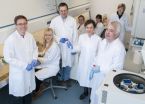(Press-News.org) Led by Joseph Proietto, Sir Edward Dunlop Professor of Medicine at the University of Melbourne and Head of the Weight Control Clinic at Austin Health, the study also found that substantial weight loss is more likely to be achieved if undertaken rapidly.
"This randomised study highlights the urgent need for committees that develop clinical guidelines for the management of obesity to change their advice," he said.
The trial included 200 obese adults (BMI 30–45kg/m²) who were randomly assigned to either a 12-week rapid weight loss programme (average weight loss 1.5kg a week) on a very-low-calorie diet (450–800 Cal/day) or a 36-week gradual weight-loss programme (average weight loss 0.5kg a week) based on current dietary recommendations.
Co-author and dietitian, Katrina Purcell said that the findings would impact the worldwide treatment of obesity.
"Global guidelines recommend gradual weight loss for the treatment of obesity, reflecting the widely-held belief that fast weight loss is more quickly regained. However, our results show that an obese person is more likely to achieve a weight loss target of 12.5 per cent weight loss, and less likely to drop out of their weight loss program, if losing weight is done quickly," she said.
The researchers found that the initial rate of weight loss did not affect the amount or rate of weight regain: with similar amounts of weight regained by 3 years by participants on both diet programmes who completed both phases of the study (around 71% in both groups).
The authors suggested a number of possible explanations for their findings including that the limited carbohydrate intake of very-low-calorie diets promotes greater satiety, and less food intake by inducing the production of hunger suppressants called ketones. Losing weight quickly may also motivate participants to stick to the diet.
INFORMATION:
The research was done in collaboration with La Trobe University.
Slow and steady does not win the weight loss race
2014-10-16
ELSE PRESS RELEASES FROM THIS DATE:
Cryptic clues drive new theory of bowel cancer development
2014-10-16
Melbourne researchers have challenged conventional thinking on how the bowel lining develops and, in the process, suggested a new mechanism for how bowel cancer starts.
The researchers produced evidence that stem cells are responsible for maintaining and regenerating the 'crypts' that are a feature of the bowel lining, and believe these stem cells are involved in bowel cancer development, a controversial finding as scientists are still divided on the stem cells' existence.
Using 3D imaging technologies, Dr Chin Wee Tan and Professor Tony Burgess from the Walter and ...
Magnetic mirrors enable new technologies by reflecting light in uncanny ways
2014-10-16
WASHINGTON, Oct. 16—As in Alice's journey through the looking-glass to Wonderland, mirrors in the real world can sometimes behave in surprising and unexpected ways, including a new class of mirror that works like no other.
As reported today in The Optical Society's (OSA) new high-impact journal Optica, scientists have demonstrated, for the first time, a new type of mirror that forgoes a familiar shiny metallic surface and instead reflects infrared light by using an unusual magnetic property of a non-metallic metamaterial.
By placing nanoscale antennas at or ...
Scientists find ancient mountains that fed early life
2014-10-16
VIDEO:
Scientists from Australian National University reveal how they found a mountain range that fed an explosion of life 600 million years ago. The range stretched 2,500 km across Gondwana from...
Click here for more information.
Scientists have found evidence for a huge mountain range that sustained an explosion of life on Earth 600 million years ago.
The mountain range was similar in scale to the Himalayas and spanned at least 2,500 kilometres of modern west Africa and northeast ...
Plant communities produce greater yield than monocultures
2014-10-16
Although monocultures can be cultivated efficiently, they are anything but sustainable: environmental damage to soil and water caused by monoculture cultivation is becoming increasingly evident. Despite their disadvantages, however, monocultures remain the principal crop form and are regarded as the sole possibility of achieving higher yields in plant production – quite wrongfully, finds Bernhard Schmid, an ecology professor at the University of Zurich, who advocates a novel form of agriculture and forestry. After all, a new study carried out by PhD student Debra ...
New perspectives for development of an RSV vaccine
2014-10-16
Respiratory Syncytial Virus causes severe respiratory tract infections and worldwide claims the lives of 160,000 children each year. Scientists at VIB and Ghent University have succeeded in developing a promising vaccination strategy to counteract this common virus infection.
Xavier Saelens (VIB/UGent): "We discovered a new vaccination strategy that paves the way for the development of a novel approach to vaccination against RSV, a virus that causes suffering in numerous small children and elderly people."
RSV: an infection that is difficult to combat
The Respiratory ...
Mild traumatic brain injury can have lasting effects for families, reports the American Journal of Nursing
2014-10-16
October 16, 2014 – Families of patients with mild traumatic brain injury (TBI) may expect them to return to normal quickly—after all, it's "just a concussion." But mild TBI can have a lasting impact on families as well as patients, according to a review in the November issue of American Journal of Nursing. The journal is published by Lippincott Williams & Wilkins, a part of Wolters Kluwer Health.
"With the increasing numbers of people with mild TBI in the community, it's crucial for nurses to make this a part of assessment for early recognition and intervention," ...
Energy prices and business decision-making in Canada: Preparing for the energy future
2014-10-16
A new expert panel report, Energy Prices and Business Decision-Making in Canada: Preparing for the Energy Future, released today by the Council of Canadian Academies, details how Canadian businesses have historically been successful in responding to fluctuating energy prices, but this should not be considered a predictor for future resiliency or competiveness. The energy environment is evolving with advances in oil and gas extraction, the development of alternative energy sources, changes within the electricity market, and new regulatory requirements. Understanding the ...
The social web of things
2014-10-16
Research to be published in the International Journal of Web-Based Communities suggests that the familiar interfaces of online social networking sites might be adapted to allow us to interact more efficiently with our networked devices such as cars, domestic appliances and gadgets. The concept would also extend to the idea of those devices connecting with each other as necessary to improve efficiency of heating and lighting, make our home entertainment systems smarter and much more.
Are you Facebook friends with your microwave oven, is your car? Does your washing machine ...
Informative visit to the toilet
2014-10-16
Emily loves Justin - Stop global warming - Two more weeks till I graduate!: The exchange of information in public toilets is widespread. It also occurs in the world of white-footed sportive lemurs. Only instead of writing on the walls, they use scent-marks in order to communicate with their own kind. In a study published online in Springer's journal Behavioral Ecology and Sociobiology, Iris Dröscher and Peter Kappeler from the German Primate Center (DPZ) have found that the urine left on latrine trees serves as a method to maintain contact with family members. It also ...
Adenosine can melt 'love handles'
2014-10-16
The number of overweight persons is greatly increasing worldwide - and as a result is the risk of suffering a heart attack, stroke, diabetes or Alzheimer's disease. For this reason, many people dream of an efficient method for losing weight. An international team of researchers led by Professor Alexander Pfeifer from the University Hospital Bonn, have now come one step closer to this goal. The scientists discovered a new way to stimulate brown fat and thus burn energy from food: The body's own adenosine activates brown fat and "browns" white fat. The results are now being ...




